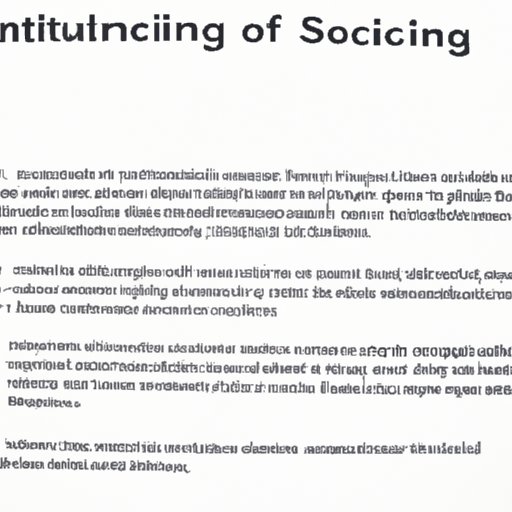Introduction
C. Wright Mills is one of the most influential social theorists of the 20th century. His work has had a profound impact on contemporary social theory and practice. One of his most famous concepts is that of the “sociological imagination”. This article will explore what this concept means, how it can be applied in practical terms, and why it is still relevant today.
Theoretical Foundations of C. Wright Mills’ Sociological Imagination
Mills defines the sociological imagination as “the vivid awareness of the relationship between experience and the wider society” (1959, p. 5). In other words, it is the ability to recognize and understand the ways in which our individual experiences are shaped by larger social forces. This concept was developed in response to what Mills identified as the “two great branches” of sociology: the abstract and the concrete (1959, p. 7). The abstract branch focuses on developing theories while the concrete branch focuses on empirical research. Mills argued that neither approach alone was sufficient for understanding the complexities of human behavior. Instead, he proposed that both should be used in combination to gain a better understanding of the connection between individual experience and wider society.
At the heart of Mills’ concept of the sociological imagination is the idea that individuals are not isolated from the societies in which they live. Rather, individuals are active participants in the production and reproduction of social structures. In other words, the actions of individuals have an impact on the larger society and vice versa. This understanding of the relationship between the individual and society is central to Mills’ concept of the sociological imagination.
Influence of C. Wright Mills’ Sociological Imagination on Contemporary Social Theory
Mills’ concept of the sociological imagination has had a profound impact on contemporary social theory. One area in which it has been particularly influential is in the theory of action. Mills argued that the sociological imagination allows us to see the connection between our individual actions and the wider social context in which those actions take place. This understanding can then inform our choices and decisions about how to act in any given situation.
Mills’ concept of the sociological imagination has also had important implications for social research. He argued that researchers need to use the sociological imagination to gain a better understanding of the connections between individual experience and the wider society. This means that researchers must consider both the macro-level factors (e.g., social structures) and the micro-level factors (e.g., individual beliefs and behaviors) when conducting their research.
Relevance of C. Wright Mills’ Sociological Imagination in 21st Century
Mills’ concept of the sociological imagination is just as relevant in the 21st century as it was in the 20th century. One area in which it is particularly useful is in understanding and responding to social change. In an ever-shifting world, it is essential to be able to recognize and respond to the changing dynamics of the social environment. The sociological imagination provides us with the tools to do just that.
Another area in which the sociological imagination is applicable is in understanding and responding to contemporary social issues. By recognizing the interconnectedness of individual experience and the wider society, we can gain insight into the root causes of various problems and develop effective solutions.
Impact of C. Wright Mills’ Sociological Imagination on Social Action
Mills argued that knowledge and practice must go hand in hand if meaningful social change is to take place. He believed that the sociological imagination provides us with the tools to do just that. By understanding the relationship between individual experience and broader social forces, we can identify areas of potential intervention and develop strategies for addressing them.
Mills also argued that the sociological imagination can help individuals to develop a sense of responsibility for the wider society. By recognizing the interconnectedness of individual experience and society, we can gain insight into our own role in creating and maintaining social structures. This understanding can then inform our actions and lead to more meaningful forms of social engagement.
Applying C. Wright Mills’ Sociological Imagination to Everyday Life
The sociological imagination can be applied to everyday life in a variety of ways. For example, it can be used to gain a better understanding of the impact of our individual actions on society. We can also use it to identify areas of potential intervention and develop strategies for addressing them. Finally, it can help us to develop a sense of responsibility for the wider society and recognize our role in creating and maintaining social structures.
Conclusion
In conclusion, C. Wright Mills’ concept of the sociological imagination is still highly relevant in the 21st century. It provides us with the tools to recognize and respond to the changing dynamics of the social environment. It also helps us to gain insight into the root causes of various social issues and develop strategies for addressing them. Finally, it can help us to develop a sense of responsibility for the wider society and recognize our role in creating and maintaining social structures.
(Note: Is this article not meeting your expectations? Do you have knowledge or insights to share? Unlock new opportunities and expand your reach by joining our authors team. Click Registration to join us and share your expertise with our readers.)
